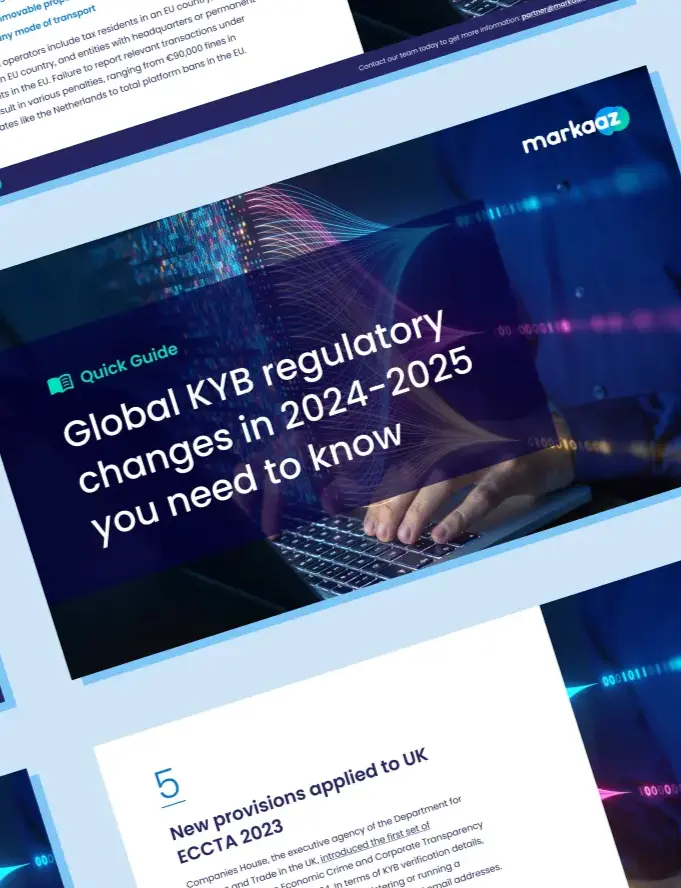Small businesses count on affordable funding to start, grow, and stay afloat when they face financial difficulties or economic downturns. This support acts as a lifeline, ensuring business owners can maintain their operations or seize timely growth opportunities.
However, the rise in small business fraud highlights the obstacles financial institutions face ensuring funding goes to legitimate small businesses. During the COVID-19 pandemic, it’s estimated that the SBA disbursed over $200 billion to potentially fraudulent actors. This equates to at least 17% of all COVID-19 Economic Injury and Disaster Loan (EIDL) and Paycheck Protection Plan (PPP) funds.
This is one of many examples that illustrates how important it is for lenders and financial institutions to have robust KYB verification and AML compliance frameworks to spot fraud and mitigate risks.
Understanding small business fraud in loan applications
Fraud can take many forms, creating a range of challenges for financial institutions. As illicit actors become more sophisticated, the methods they use to deceive and manipulate systems also evolve. Identifying common fraud patterns is a key to thwarting them.
Some of the fraud attempts financial institutions may come across include:
- Falsification of financial information: Manipulating balance sheets, income statements, or other financial documents to portray a more favorable financial position.
- Identity theft or impersonation: Using stolen identities or impersonation to gain unauthorized access to funds or approve fake applications.
- Collusion and fraudulent documentation: A more organized form of fraud where multiple parties produce fake or altered documentation to make a fraudulent claim appear legitimate.
- Payment diversion: Redirecting loan or assistance payments to unauthorized accounts, often using insider information or hacking techniques.
- Phantom employees or workers: Creating fictitious employees to inflate payroll expenses, with the intention of receiving larger loans or grants.
- Misrepresentation of business purpose: Applying for loans or grants under a false pretext, intending to use the funds for unapproved or personal purposes.
- Loan stacking: Taking multiple loans from different lenders simultaneously without disclosing previous loans, resulting in over-leveraging.
- Concealing prior bankruptcies: Hiding previous financial failures or bankruptcies to improve the chances of securing a loan or other financial assistance.
- Ghost businesses: Creating fictitious businesses with fake operations, documentation, and identities to receive funds.
The consequences of small business fraud
Financial losses are the most obvious and immediate consequence of fraud. If the lending institution does not catch deceptive acts, it will directly impact their bottom line. However, the damage doesn’t stop there. Instead, it creates a ripple effect that can be even more damaging over the long term.
The financial fallout from fraudulent activities erodes a lender’s ability to provide funding to legitimate businesses in need. Operational costs also rise as institutions divert resources to investigate, rectify, and prevent fraud. Implementing prevention steps can result in reduced efficiency and increased loan processing times.
On a larger scope, fraud can damage an institution’s reputation and may lead to legal and regulatory consequences. Significant instances of fraud can attract scrutiny from both regulatory bodies and the media, making the involved institutions appear less trustworthy. This can lead to reduced donor and investor confidence, resulting in less funding for future programs. Small business customers may also lose trust in the system, making them reluctant to seek necessary funding.
Factors contributing to the growing threat
Several distinct causes contribute to the uptick in small business fraud. Understanding each of the following factors can help institutions more effectively address and mitigate potential threats.
1. Lack of oversight and due diligence
In an effort to expedite business verification, financial institutions may bypass certain checks or fail to dig deep enough. A lack of thorough oversight creates opportunities for malicious actors to exploit gaps in the process.
2. Economic hardship
In times of economic stress, instances of fraud tend to rise. Financial hardship combined with available opportunities can tempt certain actors to manipulate the system. This creates additional strain on already overburdened lending or financial assistance programs.
3. Opportunity-driven fraud
Some malicious actors are well-versed in financial systems and look for inconsistencies to exploit. Weak links in a company’s systems and processes become prime targets for opportunistic fraudsters.
4. Insufficient KYB practices
Without comprehensive Know Your Business (KYB) procedures, institutions risk a slew of issues. Insufficient KYB business verification processes may lead to funding entities involved in illicit activities.
5. Lack of proper technology security measures
Technology has streamlined the application and verification process, making it faster and more efficient. However, without the right safeguards in place, the use of technology can also create additional vulnerabilities. Phishing attempts, data breaches, or hacking can compromise sensitive applicant data, creating significant issues for financial institutions and their clients.
Strengthening KYB oversight and AML compliance best practices
The rise in small business fraud forces financial institutions to focus on KYB oversight and tighten Anti-Money Laundering (AML) compliance standards. By focusing on a few pivotal areas, organizations can secure their operations and maintain strong compliance.
Tighten compliance requirements
Addressing current fraud challenges requires more than just following existing compliance guidelines. Organizations must update policies to match evolving regulations and keep staff and clients informed of changes.
Enhance due diligence procedures
Due diligence is a fundamental step in identifying potential risks before they escalate into larger issues. A good due diligence process involves checking new clients, reviewing existing ones, and making sure all data is correct and current. By refining and enhancing these practices, institutions can better gauge potential risks and reduce the chances of fraud.
Collaborate with financial and related institutions
Collaboration across different sectors can provide a more holistic view of potential threats, leading to better solutions for combating fraud. Financial institutions can find and stop fraud faster by sharing information and resources to create better strategies.
Use superior SMB data to improve KYB/AML compliance
By harnessing the right technology, institutions can modernize and strengthen their KYB and AML compliance. Markaaz offers a comprehensive solution to tackle fraud by improving the business verification process. Markaaz provides robust SMB business data that gives a complete and current view of loan and assistance applicants. This helps institutions make quick and informed decisions using accurate information.
Markaaz streamlines the compliance process by automating manual compliance screening checks. Integrated data delivery enhances a company’s AML compliance program and better positions it to address the evolving threats of small business fraud.
Preventing fraud in small business lending and financial assistance
Financial institutions must take proactive steps to address the increasing risk of fraud in small business loan applications. Strengthening oversight, updating compliance measures, and leveraging cutting-edge SMB data solutions can help protect financial institutions while ensuring the integrity of loan application programs.
Markaaz helps organizations prevent fraud, protect their reputations, and approval more legitimate small businesses without sacrificing efficiency. Connect with our team to learn more.



